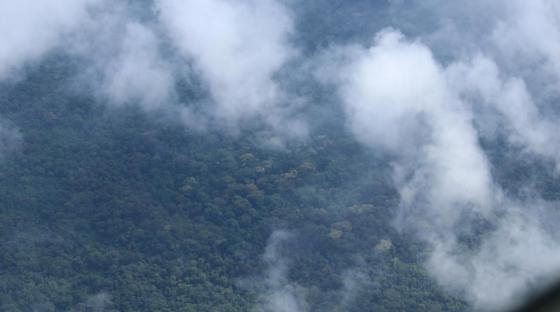Liberia: Gov’t Urged to Halt Proposed Deal With Dubai’s Blue Carbon

A forest in Sinoe County, one of the places that would be affected by the proposed Blue Carbon deal. The DayLight/James
— Forest Communities term it as threat to customary rights to their ancestral forestlands
Ongoing negotiation between the government of Liberia and Blue Carbon, a United Arab Emirates-based company, about a massive million-hectare carbon credit deal, has not only drawn fire from Monrovia-based political elites and civil society actors, but is now raising the ire of rural communities who are poised to be affected if the deal is consummated.
Representatives of forested Communities from ten of the 15 counties that have reportedly been earmarked to be turned over to the company, have described the reports about ongoing negotiations as ‘disturbing’ and that the said proposed agreement does not represent their collective aspirations.
The communities have called on the government to halt ongoing negotiations with Blue Carbon until some procedures, which have been breached by the two parties, can be addressed.
“We are deeply concerned about ongoing negotiations between the Government of Liberia and the company Blue Carbon,” representatives of the communities said in a statement issued on Thursday at the climax of a two-day dialogue held in Monrovia. “We wish to inform the government that this development is very disturbing to communities given that Liberia’s communities have been granted customary rights over the country’s land and forest.”
The counties represented at the dialogue were Sinoe, Rivercess, Grand Bassa, River Gee, and Grand Gedeh, Bong, Lofa, Grand Cape Mount, Margibi and Bomi counties.

The customary rights given to the communities by the 2018 Land Rights Act also request the government to ensure that there is Free Prior Informed Consent (FPIC) before granting any concession, especially of such magnitude and alarming size on communities’ customary land. “This has not happened and it is concerning. This is a clear indication that the government wants to impose this company on us, and it will not happen,” a participant said at Thursday’s meeting.
“We wish to remind the government that Article 33(3) of the Land Rights Act (LRA) requires FPIC of the Community for ‘any interference with or use of the surface of Customary Land’. In compliance with this provision, communities hereby demand the Government of Liberia to immediately halt ongoing negotiations with Blue Carbon and first seek affected communities’ FPIC before proceeding further.”
Though the draft contract, which this writer has seen, seeks to obligate the company and the government to “apply best efforts” to undertake the FPIC negotiations with communities in the project areas within three months, there are very little details on how those negotiations, which would need to involve hundreds of thousands of people on land covering 1 million hectares (2.5 million acres), could be completed in such a short time.
Like the forest communities, many stakeholders fear that if signed, the deal will not only hand over control of nearly 10% of the country’s total land mass to Blue Carbon, it could also override the customary land rights of communities living in a huge chunk of the country’s forests, while at the same time violating a number of Liberian laws.
The Independent Forest Monitoring Coordinating Mechanism (IFMCM) in a public statement, said a blanket transfer of land rights to Blue Carbon in the project areas would violate Liberia’s 2018 Land Rights Law, a hard-fought reform that granted communities ownership of their customary land.
“Claiming the legal rights to market the forest carbon has clear implications for property rights, as it affects the communities’ rights to determine how their land is used,” IFMCM, a group of seven environmental and community rights organizations, noted.
The presidential candidate of the opposition Liberian People’s Party (LPP), Cllr. Tiawan Saye Gongloe, has condemned the proposed carbon deal and called on the government to halt ongoing negotiation.
Gongloe noted in a statement issued last month that negotiations between the government and Blue Carbon should be suspended until communities who will be impacted by the deal are consulted.
And in a statement, 14 environmental organizations from Europe, China and the U.S. sharply criticized the deal, saying it was “unclear what the benefits for Liberia and its communities will be.
“The proposed Conservation Agreement between Liberia and Blue Carbon will definitely have severe implications for access and livelihoods to Liberia’s customary communities,” forest communities said in their Thursday’s statement—which was informed by the outcome of a two-day policy dialogue that focused on identifying lessons learned and deepening efforts to strengthen community land rights.
Meanwhile, if signed, the deal would create protected forests for the purpose of generating carbon credits that could then either be sold on voluntary markets or traded bilaterally between Liberia and other governments looking to meet their emissions targets.
Development and marketing of those credits would be carried out by Blue Carbon, headquartered in Dubai and owned by a member of Dubai’s royal family. The deal would essentially give the company practically total control over Liberia’s remaining intact rainforests for 30 years.
The draft contract also asserts that forest land granted to Blue Carbon is free of hindrances to development, a promise that the Liberian government is likely to have a hard time keeping.
